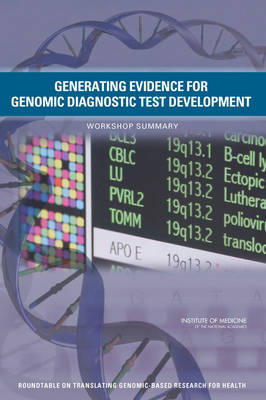
Generating Evidence for Genomic Diagnostic Test Development
Workshop Summary
Seiten
2011
National Academies Press (Verlag)
978-0-309-21104-8 (ISBN)
National Academies Press (Verlag)
978-0-309-21104-8 (ISBN)
- Titel z.Zt. nicht lieferbar
- Versandkostenfrei
- Auch auf Rechnung
- Artikel merken
Ten years after the sequencing of the human genome, scientists have developed genetic tests that can predict a person's response to certain drugs, estimate the risk of developing Alzheimer's disease, and make other predictions based on known links between genes and diseases. However, genetic tests have yet to become a routine part of medical care, in part because there is not enough evidence to show they help improve patients' health.
The Institute of Medicine (IOM) held a workshop to explore how researchers can gather better evidence more efficiently on the clinical utility of genetic tests. Generating Evidence for Genomic Diagnostic Test Development compares the evidence that is required for decisions regarding clearance, use, and reimbursement, to the evidence that is currently generated. The report also addresses innovative and efficient ways to generate high-quality evidence, as well as barriers to generating this evidence.
Generating Evidence for Genomic Diagnostic Test Development contains information that will be of great value to regulators and policymakers, payers, health-care providers, researchers, funders, and evidence-based review groups.
Table of Contents
Front Matter
1 Introduction
2 Stakeholder Perspectives on Evidence
3 Approaches to Evidence Generation
4 Overcoming Barriers for Evidence Generation
5 Considerations Moving Forward
6 Final Remarks
References
Appendix A: Workshop Agenda
Appendix B: Speaker Biographical Sketches
Appendix C: Registered Attendees
The Institute of Medicine (IOM) held a workshop to explore how researchers can gather better evidence more efficiently on the clinical utility of genetic tests. Generating Evidence for Genomic Diagnostic Test Development compares the evidence that is required for decisions regarding clearance, use, and reimbursement, to the evidence that is currently generated. The report also addresses innovative and efficient ways to generate high-quality evidence, as well as barriers to generating this evidence.
Generating Evidence for Genomic Diagnostic Test Development contains information that will be of great value to regulators and policymakers, payers, health-care providers, researchers, funders, and evidence-based review groups.
Table of Contents
Front Matter
1 Introduction
2 Stakeholder Perspectives on Evidence
3 Approaches to Evidence Generation
4 Overcoming Barriers for Evidence Generation
5 Considerations Moving Forward
6 Final Remarks
References
Appendix A: Workshop Agenda
Appendix B: Speaker Biographical Sketches
Appendix C: Registered Attendees
1 Front Matter; 2 1 Introduction; 3 2 Stakeholder Perspectives on Evidence; 4 3 Approaches to Evidence Generation; 5 4 Overcoming Barriers for Evidence Generation; 6 5 Considerations Moving Forward; 7 6 Final Remarks; 8 References; 9 Appendix A: Workshop Agenda; 10 Appendix B: Speaker Biographical Sketches; 11 Appendix C: Registered Attendees
| Verlagsort | Washington |
|---|---|
| Sprache | englisch |
| Maße | 152 x 229 mm |
| Themenwelt | Medizin / Pharmazie ► Medizinische Fachgebiete |
| Studium ► 2. Studienabschnitt (Klinik) ► Anamnese / Körperliche Untersuchung | |
| Studium ► 2. Studienabschnitt (Klinik) ► Humangenetik | |
| ISBN-10 | 0-309-21104-2 / 0309211042 |
| ISBN-13 | 978-0-309-21104-8 / 9780309211048 |
| Zustand | Neuware |
| Informationen gemäß Produktsicherheitsverordnung (GPSR) | |
| Haben Sie eine Frage zum Produkt? |
Mehr entdecken
aus dem Bereich
aus dem Bereich
aus Klinik und Praxis
Buch | Softcover (2023)
Urban & Fischer (Verlag)
CHF 58,75
Neurographie, Myographie, Evozierte Potenziale und EEG
Buch | Softcover (2024)
Urban & Fischer in Elsevier (Verlag)
CHF 79,95
Buch | Hardcover (2017)
Hogrefe (Verlag)
CHF 77,00


